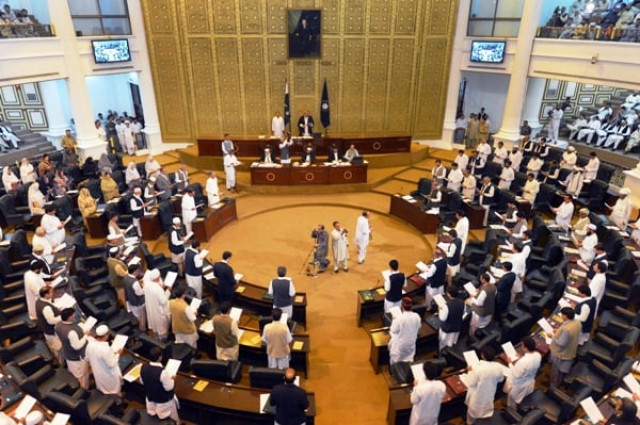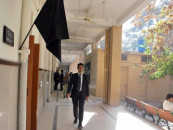K-P to present Rs645b ‘boring’ budget today
Provincial finance minister promises no new taxes while aiming to increase revenue base

PHOTO: AFP/FILE
With a promise of including new schemes with no new taxes, around 28 per cent of the budget will be reserved for developmental projects — old and new.
Khyber-Pakhtunkhwa (K-P) Finance Minister Taimur Saleem Jhagra is expected to present the budget in the provincial assembly at 3pm on Monday. Talking to a few journalists at his residence on Sunday, Jhagra outlined that the budget is focused on allocating more funds for ongoing development projects in the province. Moreover, he said that despite the paucity of funds, no new taxes were proposed in the finance bill.
Given that it is a mid-year budget since the caretaker government had already approved a Rs198 billion administrative budget for the first four months of the fiscal year, the incumbent government has outlined a budget for the remaining eight months.
“I would call it a boring budget, although we have included new developmental schemes in it,” Jhagra said.
He further said that the previous Pakistan-Tehreek-e-Insaf (PTI) government in the province had set a good trend of not presenting a budget before leaving office, leaving the task for the incoming government. The last PTI-led government could not present a budget in the provincial assembly since they had lost the simple majority in the house.
Expenditure
The finance minister, though, continued that they want to complete the unfinished tasks of the last government which is why they were allocating most of the Rs180 billion for development schemes in the upcoming budget for ongoing schemes.
The completion of the Bus Rapid Transit (BRT) project in Peshawar and the Swat motorway are high on the government’s list of projects to complete.
Terming the local government and devolution of powers and resources to the grass root the main impetus behind the re-election of the PTI in K-P with a massive mandate, Jhagra said that they have allocated 30 per cent of the provincial annual development programme for the district government. Quoting data for the past 10 years from the K-P Finance Department, the provincial finance minister said that current expenditures have been eating all the revenue which the province receives from the federal government.
“The government is bearing the maximum burden of employment which is consuming revenue which could be used for developmental schemes,” he complained.
When it was pointed out that the rapidly increasing pension liabilities were consuming a whopping 10 per cent of the budget, with the bill expected to inflate to 27 per cent of the budget over next 10 to 15 years if not addressed, the finance minister did not have any satisfactory answer.
“We will work on it but we have no plans for stopping the pensions and the present budget includes a raise for the pensioners.”
Revenue
The budget will be tax-free, the finance minister assured, adding that the government instead wants to focus on improving the collection of existing taxes.
Talking further on revenues for the government, Jhagra said that they want their due share of the Net Hydel Profits (NHP). “We want our share to be paid through the AGN-Kazi formula,” he insisted.
In this regard, Jhagra also voiced his opposition to the proposed cut in the provinces’ share in the national finance commission (NFC) award.
“As a province, we want no change in the provincial share. The powers should remain devolved,” he said.
With the economy stagnant as far as revenue generation was concerned, Jhagra said that they “want to spend money but we do not want and try to make revenue with that.” The finance minister was worried about the weak base of the province in generating its own revenue.
“Presently the low hanging fruit is making savings in the current expenditures and we can save up to Rs10 billion that could be spent on developmental schemes,” he said adding that after the budget the finance department would start visiting departments to dig out areas where money could be saved.
Published in The Express Tribune, October 15th, 2018.



















COMMENTS
Comments are moderated and generally will be posted if they are on-topic and not abusive.
For more information, please see our Comments FAQ